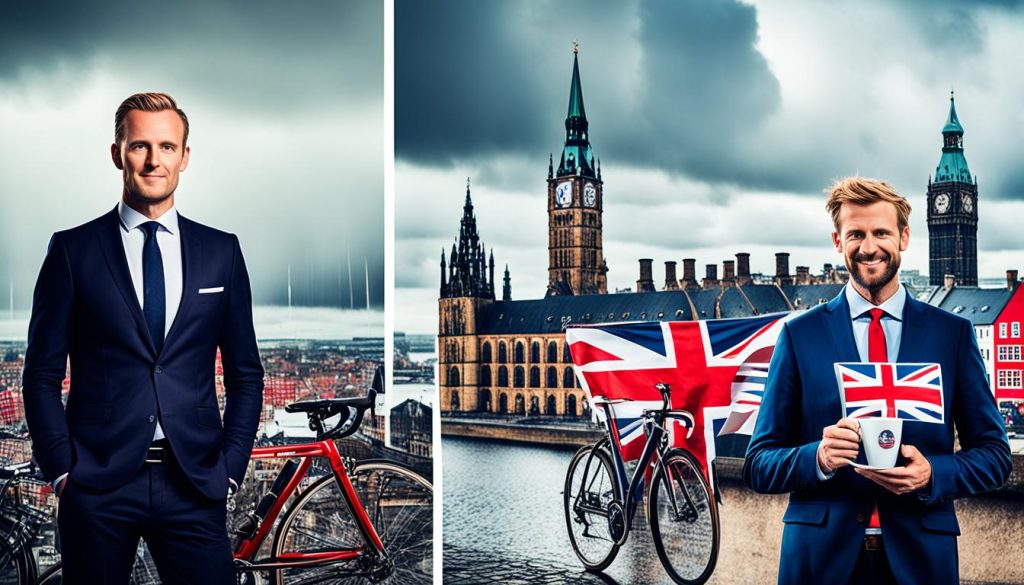Starting our journey on UK-Denmark business comparisons reveals two very different stories. These are part of the economic and cultural fabric of each country. Understanding the detailed differences between the UK and Denmark is key. Let’s explore these two unique, ambitious countries together.
Key Takeaways
- Gain a comprehensive understanding of the UK-Denmark business comparison and bilateral dynamics.
- Discover unique aspects of UK versus Denmark culture influencing corporate practices.
- Explore the multifaceted cross-cultural analysis required for successful bilateral engagements.
- Identify the strengths and challenges within the economic landscapes of both the United Kingdom and Denmark.
- Achieve insight into the societal values and business etiquettes that define each nation’s cultural identity.
Economic Landscapes: UK versus Denmark
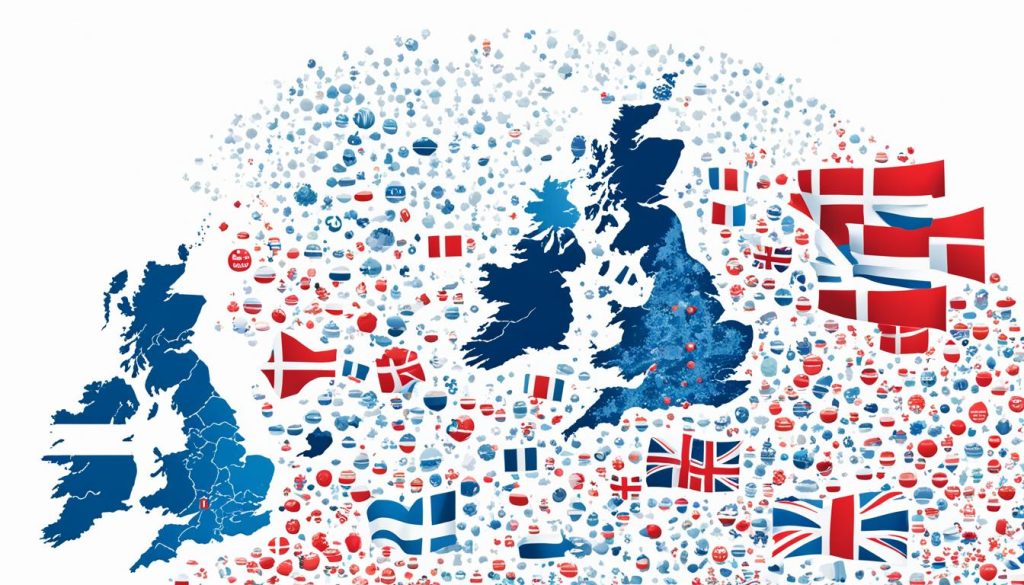
Comparing the economies of the United Kingdom and Denmark reveals interesting differences and similarities. They both have strong economies but have chosen different paths to success. This is seen in their GDP growth, main industries, and economic policies.
Comparative Overview of Economic Strength
According to World Bank data, the UK has a much larger economy due to its big financial sector. But Denmark often outpaces the UK in GDP growth. This shows Denmark’s vibrant, innovation-driven economy.
Key Industries Driving Growth
In the UK, sectors like finance, healthcare, and tech play crucial roles. London is especially important as Europe’s financial centre. Denmark, however, benefits from a strong Denmark renewable energy market. Its pharmaceuticals and maritime shipping also contribute to growth.
Impact of Economic Policies on Business
Brexit has deeply affected the UK, creating new challenges and opportunities. This has led to changes in trade and economic policies. Denmark focuses on clean energy and sustainability. This approach has strengthened its renewable energy sector.
| Country | GDP | Leading Industries | Key Economic Policies |
|---|---|---|---|
| United Kingdom | 2.83 trillion USD (2020) | Finance, Technology, Healthcare | Brexit policy, business innovation initiatives |
| Denmark | 355.7 billion USD (2020) | Renewable Energy, Pharmaceuticals, Maritime Shipping | Energy policy focusing on sustainability, economic reforms promoting innovation |
This exploration sheds light on how the UK and Denmark’s unique strengths and policies shape their economic stories. It offers insightful comparisons for understanding their economic positions.
Business Environments: Navigating UK and Danish Markets

Exploring the landscapes of ease of doing business in the United Kingdom and Denmark shows interesting differences and chances. The UK has a wide range of trade scenarios. Meanwhile, Denmark is known for its easy market access and supportive business atmosphere. By knowing their rules and how to start, businesses can succeed in both places.
In the UK, business thrives in historic trade centres and through innovation. Denmark, however, values openness, social responsibility, and green efforts. This makes it appealing for ethical and eco-friendly businesses.
The ease of doing business index measures regulatory impact on starting and running a firm. The UK and Denmark both score well, showing fewer hurdles and smoother processes.
When looking at UK trade scenarios, companies should consider changes post-Brexit. Leaving the EU brought challenges but also new trade deal opportunities.
The Danish business climate is great for startups and makes starting a business easy. It stands out with simple customs and friendly tax policies for businesses.
| Aspect | United Kingdom | Denmark |
|---|---|---|
| Market Entry Complexity | Moderate; influenced largely by post-Brexit trade agreements | Low; renowned for ease of startup and clear regulatory guidelines |
| Government Support | Extensive R&D incentives, various grants and loan schemes | Strong startup ecosystem support, public-private investment initiatives |
| Taxation Environment | Competitive corporate tax rates, various deductions and allowances | High personal income tax, favourable corporate taxation for SMEs |
| Regulatory Framework | Consistent, with adjustments after Brexit for international trade | Reputation for transparency, low corruption, and efficient bureaucracy |
In conclusion, both the UK and Denmark offer good markets for businesses. The UK provides new global partnership opportunities post-Brexit. Denmark is a leader in easy market entry and business support.
Workplace Cultures: Contrasts and Similarities

Exploring workplace culture shows big differences and clear similarities between the UK and Denmark. This comparison sheds light on what makes workers happy and companies successful.
Work-life Balance: Expectations and Realities
Denmark stands out for its work-life balance. It has flexible work hours and good parental leave. This makes Danish workers very satisfied. The UK also supports flexible working but doesn’t focus as much on work-life balance. This leads to different experiences for workers in various industries.
Hierarchy and Decision-Making Processes
The UK workplace is more hierarchical than Denmark’s. In Denmark, everyone has a say in decisions, making it more equal. The UK has clear leadership levels which affect decision-making and how things run at work.
Approaches to Employee Wellbeing and Benefits
Both countries care about their employees’ health and happiness but in different ways. The UK is starting to see the value in supporting mental health and wellness. Denmark is ahead with initiatives that support work-life balance and overall wellbeing. This matches Denmark’s focus on keeping employees healthy and happy.
Both the UK and Denmark aim for high workplace wellbeing. However, how they achieve this and the value they place on it can vary. This reflects their cultural values and work history.
Entrepreneurship and Start-up Scenes

The UK and Denmark’s entrepreneurship scene is lively, thanks to big venture capital investments. In the UK, start-ups are thriving across many sectors, enjoying an open market that loves new ideas. Danish entrepreneurs shine in design and green technologies, backed by a strong innovation network.
In the UK, London is a big deal for venture capital, but it’s not the only place buzzing with innovation. Cities like Manchester and Edinburgh are also becoming known for tech advances. Copenhagen in Denmark is great for start-ups too, thanks to its focus on design and supportive policies.
“There’s a palpable sense of ambition and innovation within the UK’s start-up community. It’s a place where idea-driven entrepreneurs transform industries,” notes a seasoned venture capitalist.
Both countries have robust support for start-ups, including mentor programmes and financial help. Venture capital plays a huge role in growing innovative projects. Investors are drawn to the UK’s financial sector and Denmark’s clean energy efforts.
| Characteristic | UK Start-ups | Danish Entrepreneurs |
|---|---|---|
| Key Sectors | Fintech, Healthtech, E-commerce | Renewable Energy, Medtech, Design |
| Major Hubs | London, Manchester, Edinburgh | Copenhagen, Aarhus, Odense |
| Funding Climate | High venture capital activity | Strong government support, strategic venture capital |
| Innovation Drivers | Technological advancement, diverse talent pool | Sustainability, product design innovations |
The mix of these factors makes the UK and Denmark’s innovation ecosystems distinct. By nurturing such environments, they stand out as leaders in Europe’s start-up world.
Corporate Governance and Regulations

In today’s world, it’s crucial to grasp corporate governance and regulations for businesses going global. The UK and Denmark offer strong systems but differ due to their laws and regulatory setups. We’ll dig into the corporate governance landscape in the UK and Denmark, including their tax policies affecting businesses.
Differences in Legal Frameworks
The UK’s legal system is based on common law, leading to a flexible approach to corporate governance. However, this flexibility might make predictability harder compared to Denmark’s codified laws. In Denmark, detailed statues create a clear and stable corporate governance framework for businesses.
Compliance and Ethics in Business Operations
Compliance and ethics are key in both the UK and Danish markets. Though both value corporate governance principles like accountability and transparency, their implementation differs. Denmark focuses on a culture of ethics rather than just following rules, showing in its anti-corruption and corporate social responsibility efforts.
Understanding Taxation: Implications for Businesses
Tax policies in the UK and Denmark significantly affect business strategy and financial planning. Both aim for fair taxation and fight against tax evasion to ensure compliance. Knowing these tax systems is vital for business efficiency and meeting national and international standards.
Impact of Cultural Dimensions on Business Practices
The blend of culture and business is always changing. It shapes how countries improve business innovation and adjust to world markets. This section looks at how unique cultural features, observed through cultural dimensions analysis, specifically influence business actions and tactics in the United Kingdom and Denmark.
Power Distance and Individualism: A Comparative Study
In the UK, businesses lean towards equality. They encourage open talks between bosses and employees. In Denmark, there’s a strong sense of individual freedom and responsibility. This shows a culture where fairness and personal rights are highly valued.
Uncertainty Avoidance and Its Implications on Innovation
Denmark sees uncertainty as a chance for innovation. They value creative thinking and taking smart risks. In contrast, UK firms mix traditional and new methods. This helps them stay relevant and competitive in the changing market.
Long-term Orientation in Business Strategies
The UK focuses on plans that look far ahead. They aim for sustainable growth and lasting benefits. Danish companies manage to be both long-sighted and quick to adapt. This lets them react promptly to market shifts while pursuing long-term goals.
| Cultural Dimension | United Kingdom | Denmark |
|---|---|---|
| Power Distance | Low | Low |
| Individualism | High | Very High |
| Uncertainty Avoidance | Medium | Medium |
| Long-term Orientation | Medium to High | Medium |
International Trade and Investment Policies
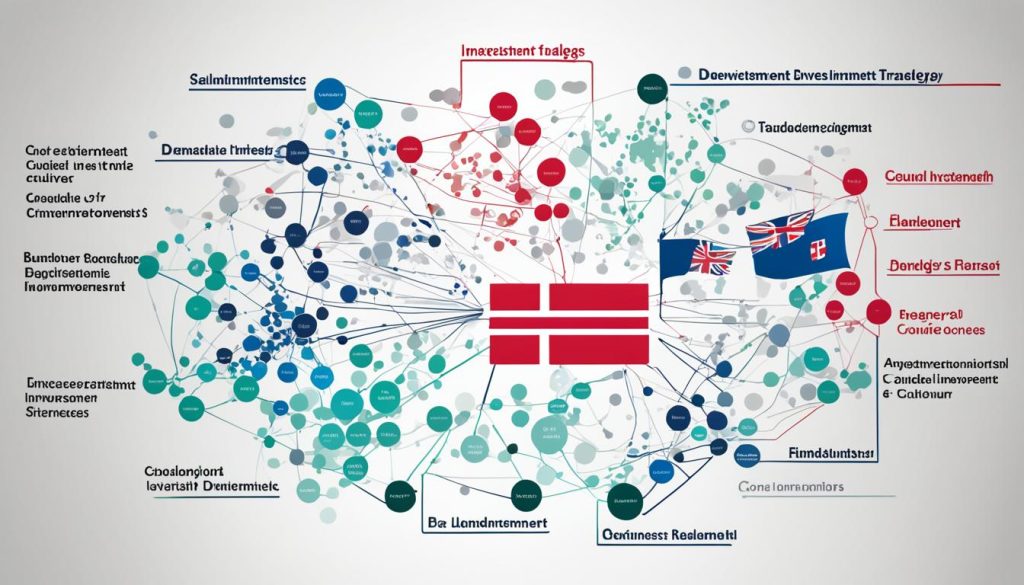
Grasping UK foreign trade and Denmark investment strategy is crucial for navigating the world of international trade. The UK and Denmark are keen on strong trade deals and investments. These match their economic goals and principles.
Denmark has a clear investment plan focusing on its strengths like clean energy and IT. This not only shows Denmark’s dedication to innovation but also attracts international investors to a forward-looking market.
The UK’s trade strategy is aimed at becoming a global trade leader post-Brexit. It seeks to diversify trade, opening new opportunities for businesses worldwide.
The essence of these goals is seen in the bilateral trade agreements both countries have expertly crafted. These deals show their commitment to growing economically through international partnerships.
Key business benefits come from these strategies. For example, Denmark’s deal with the UK lowers tariffs and makes exporting to the UK easier. This reflects the power of working together and sharing strategic goals.
- Enhanced market access and investment protection
- Prospects for innovation through joint ventures
- Streamlined regulatory processes
KUnderstanding these policies is critical for benefiting from them. For Danish and British companies aiming to enter each other’s markets, knowing these policies gives an edge. As the world changes, both countries aim to keep their trade strong, flexible, and beneficial for both sides.
Consumer Behaviour and Market Trends
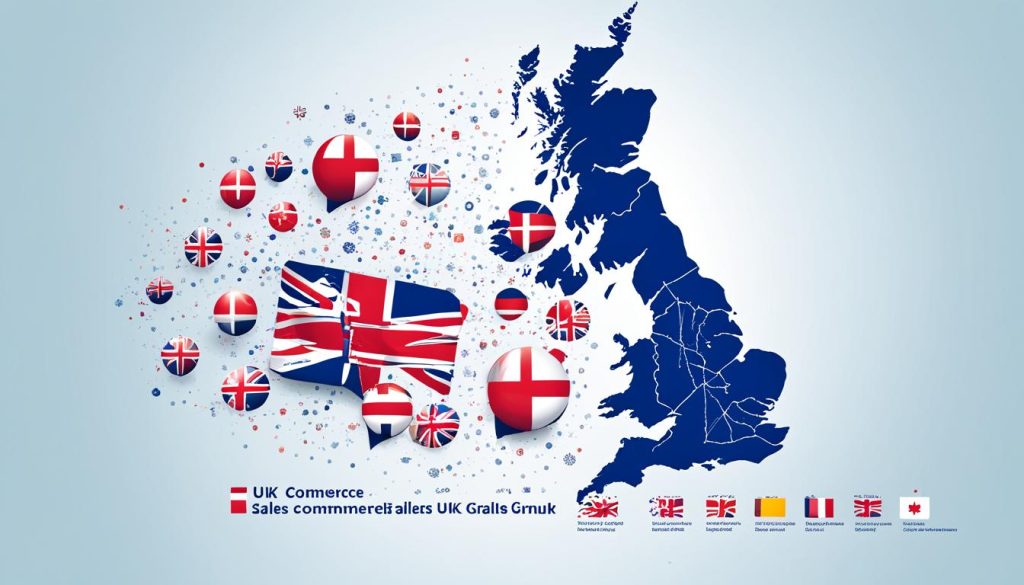
Consumer behaviour is rapidly changing, fueled by fast digital growth. This offers chances and hurdles for UK and Denmark companies. By understanding UK and Danish shopping habits, businesses get a fuller view. This helps them adapt and succeed in a tough market.
Analysing Consumer Preferences in the UK and Denmark
In the UK and Denmark, shoppers show different tastes. This highlights the need for smart marketing. UK buyers like mixing old and new in their purchases. Meanwhile, Danes prefer sustainable and stylish items. These choices reflect their cultural values, guiding companies in how to approach them.
Digital Penetration and E-commerce Trends
Digital use is booming in the UK and Denmark, making online shopping more popular. The pandemic sped this up. Denmark’s e-shops got more visitors, and the UK strengthened its digital market role.
Adaptation to Local Market Idiosyncrasies
Understanding local quirks is essential for businesses. In Denmark and the UK, strategies must reflect these differences. For Denmark, it means going green and organic. In the UK, it’s about instant services and custom shopping. Companies must mix global trends with a local feel to meet consumer needs.
Investment Climate: Assessing UK and Denmark
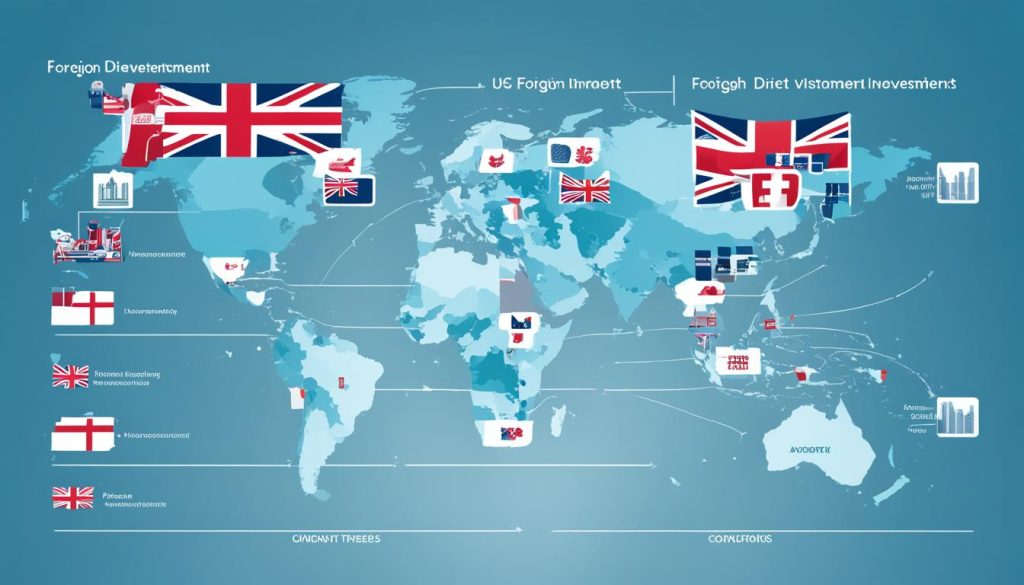
The economic landscape changes all the time. This brings investment opportunities into focus, specifically in the United Kingdom and Denmark. These countries offer interesting UK investment opportunities and positive Denmark economic forecasts. They show different dynamics and unique opportunities for foreign direct investment.
- Post-Brexit, the United Kingdom is making its investment environment more attractive. It does this through financial perks and simplifying rules for foreign investors.
- Denmark stands out for its stability and quality of life. Its friendly business policies make it a top investment choice in Northern Europe.
Financial studies and think tanks have provided detailed comparisons of the investment environments in both countries.
| Factor | United Kingdom | Denmark |
|---|---|---|
| Economic Forecast | Modest growth, strong service sector | Stable growth, focus on green economy |
| Investment Opportunities | Thriving tech and finance sectors | Sectors rich in renewables and life sciences |
| Foreign Direct Investment Trends | Emphasis on tech and financial services | High investment in renewables and manufacturing |
| Business Incentives | Tax benefits, investment grants, R&D perks | Adaptable labour market, inviting corporate tax rates |
The UK investment opportunities are evolving. The UK aims to bolster its role in global financial services. Meanwhile, the Denmark economic forecast is looking bright. Especially in sustainable energy and tech innovation. These times are crucial for foreign direct investment. Investors are closely watching political and economic shifts. Both the UK and Denmark illustrate the range of investment options and challenges in Europe’s dynamic market.
Sustainable Business Practices and Green Initiatives
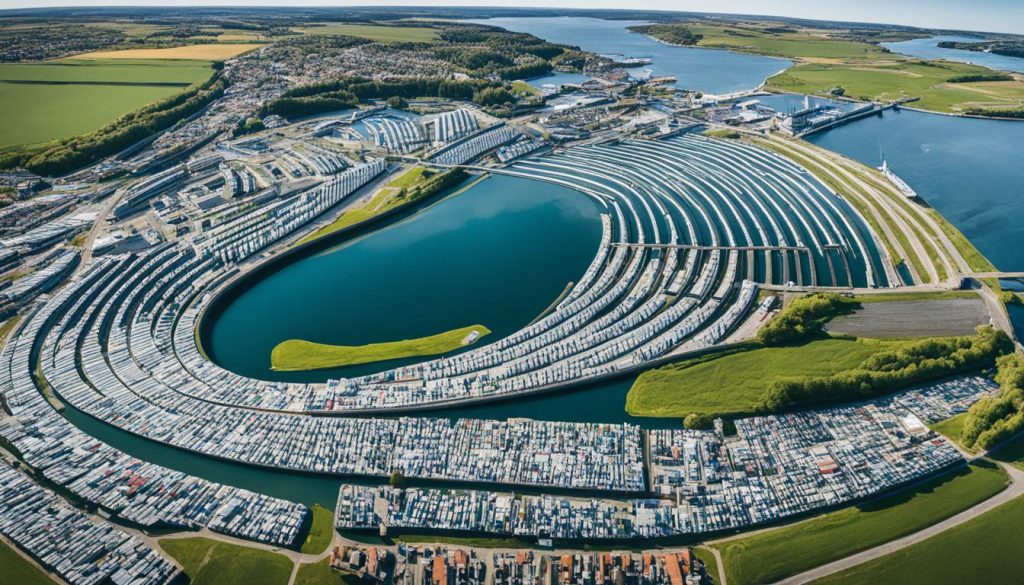
In the world of business, sustainability in business isn’t just a fancy term. It’s key for lasting success. In the UK and Denmark, leading firms are advancing the green movement. They align their work with caring for the environment and being responsible. This part talks about how forward-thinking companies keep up environmental standards and push innovation with green tech.
Corporate Responsibility and Environmental Standards
Companies in the UK and Denmark are really taking corporate responsibility seriously. They make it a big part of their main goals. Being sustainable is important for their operations. Top sustainability indexes praise these countries for their work. They recognise companies that do more than just meet environmental standards. These firms blend their business goals with looking after our planet. They’re known for doing business the right way, not just in Europe but worldwide.
Role of Green Technologies in Business Development
UK green technologies are key for businesses aiming to be profitable but eco-friendly. UK companies use innovative renewable energy and waste reduction tech. They find a balance that pleases both investors and those who care for the earth.
Innovation in Sustainable Business Models
The Denmark circular economy shows how creative sustainable business can be. This strategy changes how we use resources and reduce waste. It leads to new business ideas focused on products that last longer and are recyclable. This way, companies save money and discover new markets. It shows how business can work well with caring for the environment.
Education and Skill Development for Business Readiness
Understanding robust business education and professional development is vital in today’s world. It helps to prepare professionals with skills and knowledge. This ensures a country’s economy remains dynamic and innovative. The UK and Denmark have invested in their educational systems to strengthen their workforces.
Comparing Educational Systems and Their Influence on Business
The UK and Denmark have different educational systems but share a goal. They aim to provide top-notch business education. The UK has famous business schools with a heavy focus on both academic and UK professional development activities. Denmark focuses on business education through Danish vocational training, prioritising real-world skills and industry connections. Both believe in educating the workforce for economic success and innovation.
Role of Continuous Professional Development
Continuous professional development (CPD) is crucial for career growth and keeping up with the industry. The UK is known for its structured CPD programmes that support lifelong learning and skills improvement. This helps professionals stay updated with market trends and new technologies. Denmark ensures its vocational training is up-to-date with industry standards, keeping professionals competitive.
Collaboration between Academia and Industry
Linking academia and industry closely is key to promoting practical skills and innovation. The UK and Denmark excel in industry-academia collaboration. In the UK, universities and businesses work together on research, internships, and placements. This benefits both students and the business world. Danish institutions partner with companies, bringing industry insights into their teaching and offering practical training to students. Such collaborations bridge the gap between academic theory and practical application, pushing business and technology forward.
In conclusion, the focus on professional development in the UK and vocational training in Denmark prepares individuals for business. These educational pathways are critical in creating a skilled and innovative workforce. They enable professionals to address today’s business challenges effectively.
Navigating Cultural Etiquette in Business Interactions
Understanding business etiquette is key for strong international ties. The UK and Denmark have unique cultural norms. Knowing these is vital. The UK values timeliness, indirect speech, and recognises hierarchy. Denmark, however, prizes equality, directness, and work-life balance. These values are deeply set in their culture.
Good cross-cultural communication aids in smooth talks and deals. In the UK, a proper handshake and some light chat help. It sets the right tone for business discussions. In Denmark, people prefer to get to the point but with respect. A sincere compliment can go a long way in Denmark.
Being aware of cultural differences is crucial in international business. It requires learning and adapting. In London, exchanging business cards with a nod is common. In Copenhagen, open talks on sustainability are valued. Recognising these small differences helps build lasting business relationships. As global business grows, understanding these cultural aspects becomes more critical.

